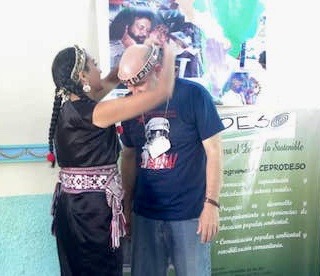 In 2010, I had the opportunity to participate in an important event in Pinar del Rio, Cuba. It was the Latin American Meeting of Experiences in the Development of Popular Environmental Education, organized by the Education and Promotion Center for Sustainable Development (CEPRODESO). I arrived there with few expectations; I didn’t really understand why they had invited me. My thoughts, which turned out to be mistaken, ran as follows: They won’t understand anything about my cosmogonic world. When I challenge the civilizational matrix that all the colonial republics of Indo-America embrace, they will be offended and accuse me of being counter-revolutionary.
In 2010, I had the opportunity to participate in an important event in Pinar del Rio, Cuba. It was the Latin American Meeting of Experiences in the Development of Popular Environmental Education, organized by the Education and Promotion Center for Sustainable Development (CEPRODESO). I arrived there with few expectations; I didn’t really understand why they had invited me. My thoughts, which turned out to be mistaken, ran as follows: They won’t understand anything about my cosmogonic world. When I challenge the civilizational matrix that all the colonial republics of Indo-America embrace, they will be offended and accuse me of being counter-revolutionary.
Far from that being the case, there was an honest openness in the Cuban compañeros in trying to understand my people’s proposal of indivisible unity with the Mapu, with the complex web of perceptible ecosystems that weave life together. There was deep reflection from everyone regarding the bond we establish with the Mapu, or Earth. At the end of the event, I gave a trarinlongko to an admirable colleague for whom I feel great fondness. Girdling his head with that thousand-year-old fabric was a metaphor, since it represents the thousand-year, cosmogonic and ancestral thought of a people that, though invaded, has never been defeated — the Mapuche nation.
Afterward I visited Havana and Santa Clara, where I was able to feel in a tangible way the capacity of the Cuban people to love, to be in solidarity in the midst of the fierce attack of imperialism, with its cursed blockade that kills! That is something I have not seen from any other country.
I come from a life where much is lacking. I know hunger perfectly well, in all its pains, in all its colors, the hunger that woke me up at night when I was a girl by tightening my stomach, sending pain from my bones from a lack of nutrition. The stages of hunger are many, and all equally intense: despair, sadness, dejection, anger. My ñuke, mother, taught us to bring out the best in ourselves in our fight against hunger: creativity, imagination, solidarity and persistence. These attributes I found in the Cuban people.
But there was something else that I perceived as I let myself wander through Cuba, something that filled me with deep gratitude: Cuba with its planetary gaze of solidarity, the pupils of justice in that long-suffering people who always knew how to look beyond and therefore extend their humanity to the most hidden recesses of the planet. They created scholarships so that oppressed peoples of the world could send their youth to study. So young Mapuche were in Cuba studying medicine, physical education, earning master’s degrees. Climbing onto the scaffolding of the world of education, something restrictive for indigenous peoples, was possible on this small blockaded island.
I also saw revolutionaries of the Lefts of the world passing through Cuba, bloated with supremacist ego, using their revolution-meter to measure socialism’s successes and by day, while at night, in the starry darkness lit by the red lights of prostitution, they consume bodies offered out of desperation. I do not believe in the angry speeches of bureaucrats of any stripe, nor in the morality of nations uniting, nor in the binarism that disembowels truth, tugging it back and forth between villains and heroes. I do not believe in the vertigo of waves that applaud, from other seas, the fury unleashed by the fatal brilliance of a capitalism that sells itself as human and free, nor in a socialism thought of as stagnant and disconnected from the spirit of the earth. I do not believe in States, because it is in the DNA of States to police and punish.
As I write this to you, another memory swirls in my mind. It is that of the Cuban campesinos remembering the flavors of yesteryear, the fruits of the land, the foods of their ancestors before monocultures and soil erosion. Could it be that Indo-America is remembering that there were other worlds? Is another way possible of reconstructing ourselves in reciprocity with the earth, with respect and love for it? Is another socialism possible? Will this be the time for indigenous peoples and all peoples of the world to dialogue and build new epistemologies, new identities and new telluric outlooks?
I believe in the Cuban people, in their resilience, in the radiance of their light as they climb the rungs of collective dreams. I am ashamed of the [world’s] indifference, the irresponsibility of their words, the lack of commitment to the Cuban people. The facts, not speeches, will determine us. As a Mapuche woman I practice manuntvn, reciprocity. That is why I will be collecting medicines to send to Cuba. I hope all sisters and brothers who are beneficiaries of Cuban aid will join this campaign. I am sure that we will be able to make our help arrive. Territories have memory; it is there where we peoples find the answers for organizing our worlds and creating good living as a right.
From the Puelwillimapu, I embrace my kom pu lamngen from Cuba from the bottom of my heart.
Translated by Kelly Garrett.



